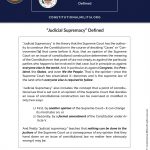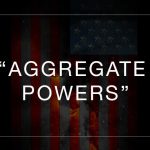Last Updated on September 2, 2022 by Constitutional Militia
(continued from page 2)
DAVID: So do you really think a collapse of the Western civilization is avoidable at this point?
EDWIN: No. That’s what I’m worried about.
DAVID: It seems avoidable if the politicians acknowledged the reality of the situation and dealt with it accordingly, but do you see any hope that it’s politically likely?
EDWIN: Well, I’m going to give it a year or two to see what the states start doing here. We’re seeing more and more resistance, at least verbally, coming out of state legislatures and even out of some state governors to various encroachments by the people in Washington. We’ve seen some push-back in the healthcare area, TSA, and then there’s this business with illegal immigration, and now some states are beginning to talk about monetary reform.
There’s not too much the states can do about TSA. There’s probably not too much they can do about healthcare, because that would have to be decided in the courts, and god knows that’s a wasteland. Immigration is kind of back and forth/up and down, but on monetary reform, if a state passed the right statute, they could potentially bring that about within 30, 60, or 90 days. Especially if they put in one of these electronic gold/electronic silver type systems, which is off-the-shelf technology.
DAVID: How could it work?
EDWIN: Within 90 days of the passage of the statute, you could have everybody in that state with electronic gold debit cards dialed into the price structure in all of the supermarkets and so forth. People could essentially opt out of the Federal Reserve System if they wanted to.
DAVID: So watching the states for a hopeful plan is something we can do.
EDWIN: That’s right, and if they don’t do it within the next year or 18 months, then I would begin to become very pessimistic.
DAVID: Since we’re talking about being pessimistic, let’s talk a bit about the real dark side of all of this—namely that it appears to many that the U.S. is in the early stages of becoming a police state. Supporting that view, there are things I thought I’d never see in my lifetime, institutionally sanctioned renditions and torture, Guantanamo, the recent Supreme Court ruling that police can kick down your door based upon hearing what they consider to be a suspicious noise—the list of things the government is doing these days goes on and on, including the current blatant attempt to assassinate Gaddafi. So where do you think we are on the scale from 1-10, 1 being perfect liberty and 10 being full-on police state?
EDWIN: About 6-1/2 to 7, because they’ve set up the principles for it. You don’t have to have the police breaking in every day to have a police state, you simply have to have the judiciary saying, “If they break in, we’ll let them do it.” It’s the principle of the thing. The NKVD didn’t arrest everybody in Stalin’s Russia, but the principle was in place so they could arrest anybody, and that’s the problem.
If you type “police brutality” into Google or some other search engine, how many YouTube hits do you think you’ll get? Huge number, right? And they become more grotesque every day. If I were a Supreme Court justice, I might look at this and say, “This is the real problem in the country,” but of course those people live in an ivory tower, so they don’t know or perhaps care about reality. If they did, they would know enough to know this is becoming a real problem.
So, as a Supreme Court justice, would I want to give them a principle that allows the police to solidify and expand that kind of oppressive behavior? And the answer would have to be, “No, I don’t.” The Constitution could never have foreseen this or allowed for this, right?
DAVID: Right.
EDWIN: And yet they allow for it. Now, either this is the biggest bunch of idiots that has ever been assembled in judicial robes in the history of humanity, or there’s some other agenda going on here.
DAVID: Assuming that they are not complete idiots, what could that other agenda be?
EDWIN: In my view, and I’ve written about this for years, the people at the top levels of government understand that their monetary system is inherently flawed. That we’re on the Titanic, in a sense, and they know that this ship is going to sink. They don’t know when, but they know when it sinks, they’re going to have a huge amount of economic dislocation, social crisis and civil unrest to the level of revolt.
So they started developing this police state mechanism in the hopes of keeping the lid on the garbage can when the monetary system breaks down. The upper echelons of the judiciary have been going right along with this because they know what the program is. This is obvious. No one in his right mind would stand by and allow the sort of excesses we’ve seen.
Just the other day, the Indiana Supreme Court ruled that the Fourth Amendment doesn’t apply at all because you can sue the police after they’ve mistakenly broken into your home. But when they break into your home and they kill you, then what?
DAVID: Not a lot of recourse then.
EDWIN: Right, like that poor ex-marine that was shot 60 times in Arizona, and he’s dead—now what, can he bring a lawsuit? Have we lost our minds? I mean, you don’t have to be a Harvard-educated lawyer to know that this is insanity. This does not rise to the level of just mere error. No one in his right mind can write these kinds of opinions, which means that either they’re insane, which I don’t believe, or they have another agenda, and the judicial opinions are simply camouflage—they’re propaganda to convince us that “Oh well, this is all right” because Judge Flapdoddle told us that it’s all right.
DAVID: Likewise, when you look at what’s been going on with the government’s spending, which is clearly insane, I mean, who would have thought they could even conceive of running a $1.5 trillion annual deficit?
EDWIN: And going up.
DAVID: And going up, and planning on this continuing well into the future. In your paper “A Cross of Gold,” you mentioned that all told, the U.S. government’s total outstanding obligations at this point add up to something like 200 trillion dollars?
EDWIN: Yes, that’s Professor Kotlikoff’s, at Boston University, figure, not mine.
DAVID: So it’s hard to draw any other conclusion than that the government is operating in a complete fantasy. That everything is completely off the rails. Then you look at the judiciary and some of the things they have approved and looked the other way on, and it sure begins to look like fascism to me.
You and I see it, a lot of our readers look at it, but most people are so passive about it. Everybody is so quiet, and there is nobody making any waves—is that because it’s too late? Before you answer, I’ll give you just a quick anecdote that I think makes the point.
I was at a party not too long ago with a bunch of young people, and we were talking about some topic that was mildly controversial, and one of them said, “I’d love to look up more about that online, but I don’t want it to be part of my permanent search record.” So, the youth of America already have it in their heads that anything they do online is being monitored and will be in their search records forever and accessible to the government.
Back to my question, have we reached that stage where people are quietly huddling behind the doors of their houses, trying to keep a low profile so the government will leave them alone?
EDWIN: Given the current state of things, I’m sure there are a lot of people deliberately deciding to adopt a low profile, politically or socially. A lot of this has to do not so much with politics but what your neighbors or your coworkers will say about you, right? If you tell them something that is actually happening in the world, you will be labeled a conspiracy theorist; they’ll look at you as if you’re crazy.
But what about the activists? At a certain stage, the great mass of people will look around for leadership figures. When the economic crisis comes, they’re going to want someone to tell them how to get out of it. They’re not going to know the answers themselves. The question is, will there be activists, leadership figures, proposing the right solutions—and how soon will they come along?
That’s why I look at this Tea Party Movement, using that in a generic sense, an indication of the ground swell of discontent that’s out there. There’s a huge amount of that, but at this point it’s not particularly directed. Of course the establishment is trying to co-opt it, with Gingrich and others trying to claim that they’re leadership figures in this movement, and that deflects it from the direction in which it ought to go.
By contrast, you do have the Ron Paul-type movement. I mean, look at Ron Paul as an example. This is not a charismatic figure. He’s a very diffident individual, a very shy individual, not someone that you could possibly imagine as a man on a white horse in a political sense. He certainly has had very little real effect in Congress. He’s been the gadfly, he’s been the critic, but he hasn’t put in any legislation of consequence that has been passed. He’s made a lot of noise about the Federal Reserve, but he’s constantly being blocked by the real power structure in Congress in terms of getting anything done there. Yet nevertheless a whole political movement has essentially crystallized around him.
I look at him as the surfer on the wave. The surfer is not the important thing, the wave is the important thing. The surfer would be nowhere without the wave. That wave is out there, and it’s just waiting for the right surfer. He’s the first one that’s come along, but there will be others, perhaps some state governor who is actually competent, and he looks at this monetary system and he says, “To hell with this. Here’s what we have to do,” and they put in that alternative currency statute, the proper one, not the kind of statement that was made in Utah, but a proper functioning one. In which case he will become the next president of the United States, and then we will see what will happen.
DAVID: Any time the states try to go their own way on issues that the federal government doesn’t like, the federal government starts to threaten them with losing their highway funds or education funds, or whatever. Isn’t that part of the problem?
EDWIN: Well, it certainly is part of the problem, and that’s why you’re going to have to have some real leader in the state who is going to say, “We have priorities, and our first priority is correcting the monetary problem, the currency problem, and we’ll worry about those federal education funds later. In fact, what we may do is stop paying some money to the federal government.”
Unfortunately, once you allow the federal government to have the kind of influence they now have over the states, the states have essentially rolled over. So, at some stage, they have to say no.
That’s why I say that at some point down the line, if we see nothing happening on the state level—if we see these bills being put in and being constantly defeated, and no one comes forward to take leadership on these issues—well, I’ll throw up my hands and say, “We just don’t have the leadership group, we don’t have the Patrick Henrys, we don’t have the Thomas Jeffersons, we don’t have the Sam Adams, we just don’t have those people anymore, and that’s the end.”
But I don’t believe it will come to that. We have over 300 million people in this country, we can’t find a few hundred?
DAVID: Well, we will certainly keep an eye on the states for somebody to show up one of these days. Governor Christie in New Jersey seems like a pretty sound guy.
EDWIN: I want to see just two things, because there are two things of real consequence right now in terms of the major powers of government historically and in terms of political philosophy. Those two things are the power of the purse and the power of the sword. In order to continue spending at the levels it now is, the government has to maintain control over the monetary system, and it has to have some kind of control over military and police force.
Under our Constitution, those two powers are supposed to be ultimately in the hands of the people. We’re supposed to have a free-market-oriented and controlled monetary system based on gold and silver, so the politicians really do not have control over the purse. They have to come to us and ask for taxes. They can’t manipulate the money and use inflation as a hidden tax. We’ve lost that. We failed to assert it—let’s put it that way.
On the other side, we see this police state developing, with a centralized Department of Homeland Security in Washington that has tentacles reaching down into every local and state police force. This is completely contrary to the Constitution because the Constitution tells us that the thing that’s necessary for the security of a free state is what? A well-regulated militia. And what is a well-regulated militia? It’s composed, as the Virginia Declaration of Rights in 1776 said even before the U.S. Constitution, of the body of the people—the people organized in a certain way. Think of Switzerland.
Well, we’ve lost control over those two key elements, and until we get them back, we can only continue down this road to the full-blown police state. So in sizing up any politician, I’d start by asking them these two things: “What are you going to do in the state to return us to a system of constitutional currency with an alternative system in this state because we can’t do it in Congress?” And, number two, “What are you going to do to revitalize some kind of state militia structure, perhaps using Switzerland as the model because they’ve been very successful over the years, so that we are no longer under the control or answerable to Janet Napolitano?”
If the states can’t regain control over those two things, the rest of it is a waste of time. If you don’t have control over the high ground, as the military people would say, then you’ve lost the battle. Education funds, transportation funds, all the rest of this stuff is not even icing on the cake if you let the federal government continue to have those two powers.
They took power over the money a long time ago, and they have been systemically organizing this police state since well before 9/11; in fact, the plans for the Patriot Act were drawn up before 9/11. They understand where the high ground is, and that’s why if you are a state politician and you can’t answer those two questions—if you don’t tell me that those are your number one and number two priorities—forget it, we’ll look to somebody else for leadership.
DAVID: It seems to me that unless and until there is some sort of a push-back on the state level, the situation is going to grow increasingly dangerous, looking for a trigger, so to speak. Much in the way the Arab Spring blew up almost overnight. People looked at that and said, how did that ever happen? These are some of the most oppressed people in the world, ignorant and backwards and everything else, and all of a sudden they are in the streets, risking their lives for more freedom. So, it would seem that it’s just a matter of time before we see something akin to an American Spring here.
EDWIN: Oh, I think so, yes. It’s just terrible to think that we have to take second seat to the Egyptians in the promotion of liberty. Not to criticize the Egyptians, but Egypt has never been considered to be a country that philosophically was in the forefront of that area.
DAVID: Speaking of Egypt, I think the jury is still out on whether the military will allow the freedom movement there to take power. The Saudis are falling all over themselves to give the Egyptian military money, as is the U.S. government, so it would appear that we’re now trying to solidify their power.
EDWIN: Please don’t say “we” when referring to the people in Washington. Don’t include me in that list.
goldDAVID: (laughs) Doug Casey often says the same thing. And on that note, I’ll sign off by thanking you very much for your time. Let’s do it again some time.



































